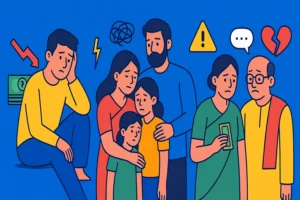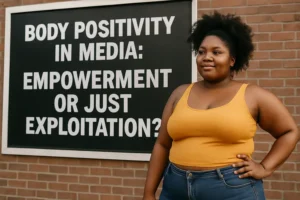Phubbing Explained: Why Our Phones Are Stealing Attention From the People We Love
We’ve all been there—you’re talking to someone, and halfway through your sentence, they glance down at their phone. Maybe they smile at a message, scroll for a moment, and then look back as if nothing happened. This small, everyday act has a name: phubbing—short for “phone snubbing.”
Phubbing is the act of ignoring someone in your immediate presence because you’re focused on your phone.
In our smartphone-driven world, phubbing has quietly become a social norm, creeping into dinners, meetings, classrooms, and even romantic dates. While it might seem harmless, the habit carries deeper consequences for our relationships, our attention spans, and even our sense of connection.
Phubbing is not just about checking a notification—it’s about what that moment says: something on my phone is more important than you right now.
In this article, we’ll explore the sociology behind phubbing, why we do it, and how it’s reshaping the way we connect with the people around us.

What Is Phubbing and Why It Matters
Phubbing is the act of snubbing someone in a social setting by prioritizing your phone instead of engaging with the person you’re with. It’s a form of social distraction that can negatively impact relationships and communication.
The word comes from blending “phone” and “snubbing.” It might seem harmless—just checking a notification while your friend is talking—but its social consequences are bigger than they appear.
In today’s hyper-connected world, phubbing has become almost normal in cafés, offices, classrooms, and even family dinners.
The rise of smartphones has changed how we divide attention, creating a silent shift in how we value real-world interactions.
Sociologists point out that phubbing doesn’t just affect personal relationships; it reflects broader cultural trends where digital connections are prioritized over face-to-face communication. This shift can lead to feelings of rejection, loneliness, and reduced relationship satisfaction for the person being ignored.
Understanding phubbing isn’t about blaming technology—it’s about recognizing a behavioral pattern that has embedded itself into modern life.
If we explore its social roots, we can learn how to balance digital engagement with meaningful human connection.
The Rise of Smartphones and Social Habits
Over the last two decades, smartphones have gone from luxury gadgets to everyday essentials. With their convenience, they’ve merged communication, entertainment, work, and shopping into one portable device.
But with this power comes a subtle cost: our attention. Social habits have shifted dramatically since the introduction of constant internet access in our pockets.
Waiting in a queue? We check our messages. Riding a bus? We scroll through social media. Sitting with friends? A quick glance at a notification can snowball into minutes of distraction.
Psychologists argue that the “always-on” culture reinforces the habit of looking at our phones even when nothing urgent is happening.
In sociology, this is linked to a concept called “technological determinism,” which suggests that technology shapes human behavior more than we consciously realize.
The more we use smartphones in social situations, the more normalized phubbing becomes. Over time, it’s less about intentional rudeness and more about habit—though the impact on relationships remains the same.
This video explains why we ignore people because of our phones.
Why We Choose Phones Over People
Choosing to look at your phone instead of engaging with someone nearby often happens subconsciously. Several factors explain this behavior.
First, smartphones offer instant gratification: new messages, social media likes, or breaking news create a dopamine rush in the brain.
Second, there’s the fear of missing out (FOMO)—we worry about being “out of the loop” in online spaces.
Third, multitasking has become a modern badge of productivity, making people feel that they’re managing life better by keeping one eye on their phone.
From a sociological perspective, this also ties into “social capital,” where online interactions and visibility are seen as valuable currency.
We may not admit it, but checking a work email or reacting to a friend’s Instagram story can feel more urgent than finishing a face-to-face conversation.
Unfortunately, this constant prioritization of digital communication over physical presence sends an unintended message: that the person we’re with is less important than our device.
The Psychological Effects of Being Phubbed
Being on the receiving end of phubbing can feel surprisingly hurtful. Even if the other person insists they “just checked one thing,” it can trigger feelings of rejection and invisibility.
Psychologists have found that being ignored in favor of a phone can activate similar emotional responses as being excluded from a group. This taps into our deep human need for belonging and validation.
Over time, repeated phubbing can reduce relationship satisfaction in couples, create tension between friends, and even weaken team cohesion in workplaces.
People who are regularly phubbed may start engaging less in conversations, expecting to be ignored. In extreme cases, it can lower self-esteem and increase social anxiety.
From a sociological angle, it shows how micro-behaviors—like glancing at a phone—can have macro effects on trust and connection.
The irony is that while smartphones aim to connect us, phubbing leaves people feeling more isolated than ever.
Phubbing in Different Social Contexts
Phubbing doesn’t look the same everywhere. In romantic relationships, it can be interpreted as emotional distance, leading to misunderstandings and decreased intimacy.
In workplaces, checking your phone mid-meeting can signal disinterest or disrespect, potentially affecting career opportunities.
In classrooms, students phubbing teachers—or vice versa—disrupts engagement and learning. Even in casual friendships, a habit of phubbing can subtly erode closeness over time.
Cultural norms also shape how phubbing is perceived. In some societies, constant phone checking is accepted as part of modern multitasking, while in others it’s viewed as outright impolite.
For example, countries with strong traditions of hospitality may find phubbing especially offensive because it contradicts cultural values of attentiveness and respect.
Understanding these social contexts helps us see that phubbing isn’t just an individual choice—it’s shaped by where we are, who we’re with, and the unspoken rules of that environment.
The Sociology Behind the Trend
From a sociological perspective, phubbing reflects larger shifts in how humans interact.
One key concept is “mediated communication,” where technology becomes the main channel for interaction, even when face-to-face contact is available.
Another is “attention economy,” where companies compete for our focus, making devices intentionally hard to ignore.
Phubbing also ties into Erving Goffman’s theory of “face-work,” where maintaining attention in conversation is part of showing respect.
If we break that attention, we disrupt social harmony and signal that our priorities lie elsewhere. Furthermore, the digital world creates “micro-status updates” that feel socially urgent—liking a post, responding to a message—making it harder to resist checking our phones.
Sociologists argue that this behavior is less about individual rudeness and more about being caught in a system designed to pull attention away from the present moment. This makes combating phubbing a societal challenge, not just a personal one.
How to Reduce Phubbing in Daily Life
Reducing phubbing isn’t just about etiquette—it’s about protecting your relationships, mental health, and sense of connection. Reducing phubbing starts with awareness—recognizing phone overuse and choosing mindful, present interactions instead.
First, set clear “phone-free” zones or times, such as during meals or while having important conversations.
Second, use your phone’s digital wellbeing tools to track screen time and set app limits.
Third, communicate openly with friends, partners, or colleagues about the value of being fully present.
Simple habits, like keeping your phone face-down or in another room, can significantly reduce the temptation to check it.
Group activities, like board games or shared hobbies, also help replace screen time with real interaction.
From a social standpoint, practicing “micro-affirmations” during conversations—nodding, making eye contact, asking follow-up questions—reinforces the importance of the other person’s presence.
Over time, these small changes can shift group norms so that not checking your phone becomes the expected behavior. It’s not about abandoning technology but about reclaiming control over how and when we use it.
📵 Simple Ways to Reduce Phubbing: Summary
- Set phone-free zones: Keep phones away during meals, meetings, or family time.
- Use “Do Not Disturb” mode: Silence notifications during conversations to stay present.
- Schedule screen time: Create specific times for checking your phone to avoid constant distractions.
- Talk about it: Openly discuss phubbing with friends or family to set respectful boundaries.
- Practice mindfulness: Focus on the moment and the people around you, not your screen.
Building a Culture of Presence
Ultimately, addressing phubbing is about building a culture where presence is valued as much as connectivity. This means reshaping social norms so that focusing on the person in front of you is the default, not the exception.
Schools can encourage phone-free classrooms to strengthen student engagement. Workplaces can promote “device-free” meetings to improve collaboration.
Families can set aside daily tech-free time to reconnect. On a societal level, campaigns highlighting the value of real conversations can help shift public attitudes.
Psychologically, being fully present allows for deeper listening, stronger empathy, and richer shared experiences.
Sociologically, it strengthens community bonds and reinforces trust. The key is not to demonize smartphones—they’re incredible tools—but to use them in ways that support, rather than replace, real human connection.
In a world where digital distractions are endless, choosing presence is a radical, relationship-strengthening act.
Read Here: The Impact of Digital Nomadism on Social Connections
Conclusion: The Sociology Behind Our Smartphone Obsession
Phubbing might seem like a small habit, but its impact on our relationships and social life is anything but small.
Every time we choose our phone over the person in front of us, we send a silent message about our priorities. Over time, those little moments can add up, creating distance and weakening bonds.
The truth is, our smartphones aren’t the problem—it’s how and when we use them.
By becoming more aware of our habits and setting simple boundaries, we can reclaim the art of being present.
Choosing to give someone our full attention is more than good manners—it’s a sign of respect, care, and genuine connection.
In a world full of digital noise, presence is a gift we can all give each other.
So next time your phone buzzes mid-conversation, try ignoring it—and see how much richer that moment becomes.





